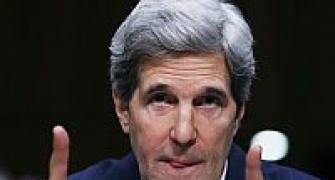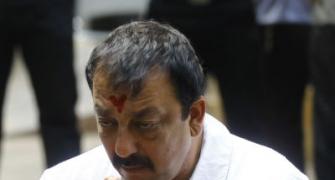 Renowned terror expert and author Stephen Tankel believes Indian intelligence agencies know more about Pak-based terror groups than it knows about indigenous Indian Mujahiddin. Also, LeT and other outfits might revive their terrorism against India post-2014. Aziz Haniffa reports.
Renowned terror expert and author Stephen Tankel believes Indian intelligence agencies know more about Pak-based terror groups than it knows about indigenous Indian Mujahiddin. Also, LeT and other outfits might revive their terrorism against India post-2014. Aziz Haniffa reports.
American terrorism expert Stephen Tankel, who did extensive field research in India last year, has found that Indian intelligence knows more about Pakistani terror groups than it knows about its own indigenous militant outfits like the Indian Mujahiddin.
Tankel, one of the foremost experts on the Lashkar-e-Tayiba, the Pakistan-based terrorist group responsible for the horrific 26/11 Mumbai attacks, believes that post-2014 once the US and NATO troops withdraw from Afghanistan, the LeT and other Pakistan-based militant organisations could revive their terrorism against India.
Author of Storming the World State: The Story of Lashkar-e-Taiba, Tankel , who was the lead speaker on the panel on The Future of South Asian Stability at the conference held in conjunction with the launch of the report titled Trends in Militancy Across South Asia: A Region on the Brink at the Center for Strategic and International Studies, said the Indian Mujahiddin “is probably one of the less understood militant entities in South Asia,” and Indian intelligence officials had been quite free to admit this fact.
“When one speaks to Indian intelligence officials, they will tell you that we actually have a better understanding of Pakistani groups than we have of our own indigenous networks in some instances.”
Tankel said his extensive research on the IM had found that it should be viewed “not as a group but I tend to look at the Indian Mujahiddin as a label for a network of modules that has a loose leadership and that loose leadership moves between Pakistan and the Gulf with maybe one or two commanders on the ground and familial relationships are important -- the Bhatkal brothers and their cousin in India seen as the on-ground commanders.”
He said they were “sanctuaried in Pakistan but moving to the Gulf back and forth,” and argued that it was “important to ask the question about what does it mean in terms of support from external actors and command and control.”
Tankel noted, “In particular, because if the Indians perceive IM attacks to be sort of directed by ISI they would respond differently than if you would have a problem that is home-grown just watered and fertilised by your neighbour.”
“My sense is that the group was able to regenerate thanks to external support from Pakistan and perhaps from Lashkar-e-Tayiba as well, and that certainly there are instances where the IM does what either the LeT or (Pakistani spy agency) Inter Services Intelligence might direct it to do but that doesn’t mean that it also doesn’t do things on its own.”
In this regard, Tankel reiterated, “Therein lies one of the potential dangers in terms of India’s response.”
“There is some indication that because the networks haven’t fully regenerated that whereas by 2008 when LeT and IM networks were somewhat distinct, that again these two streams are crossing and again raises concerns as to what we may see as post-2014 in particular if the ISI were to exercise control over the IM.”
Tankel said the ISI would “use the Indian Mujahiddin as a proxy while quote ‘making progress’ by reining in the LeT. I don’t think we are necessarily there yet but I would point out that it’s something to keep one’s eye on going forward.”
Meanwhile, he said, “India and especially Kashmir, still matter to the Pakistan-based militant groups.”
“Every group is now active in Afghanistan but that could change post-2014,” he said, and predicted that Pakistan which has “been restraining its India-centric groups from launching massive terrorist attacks against India since 2008,” could let them loose against India once again.
Tankel said, “The Kashmir front is torpid now -- there are rumblings of activities, but it’s too soon to know if it’s a blip or a trend.”
“But what is important is that as Kashmir has declined, and in lieu of attacks against India, Afghanistan has become a safety valve for a lot of these groups -- Lashkar-e-Tayiba in particular. We saw an escalation there in 2010 as they were being restrained after the 2008 Mumbai blasts.”
According to Tankel, post-2014, the debate in Pakistan would center on “whether they should concentrate externally or internally, and if externally, should the focus be against the Afghan state residual Western forces or for the India-centric groups, should they once again re-orient against India.”
But if such a scenario were to manifest itself and there are “more spillover attacks against India, we could also potentially see New Delhi and Kabul providing the Tahrik-e-Taliban Pakistan and associated militants there (in Afghanistan) the type of support Islamabad already suspects it receives.”
Thus, according to Tankel, an asistant professor at AmericanUniversity and a non-resident scholar at the Carnegie Endowment for International Peace, it would be ironic since Pakistan “could find itself facing a durable cross-border jihadist threat along the lines that it has historically supported against other countries.”
He said it was highly unlikely that Pakistan would dismantle its militant infrastructure in the near term, and argued “the ongoing insurgency in Pakistan makes it less likely that it will take action against pro-state groups,” like the LeT.
As a key take-away, Tankel predicted, “Pakistan’s approach to and the dynamic nature of the militant milieu couple with the regional tensions that are likely to ensue as the US draws down (from Afghanistan), contribute to the risk of a destabilising incident or at the very least, make it less likely that we will achieve stability in the region in the short-term.”
Image: Stephen Tankel








